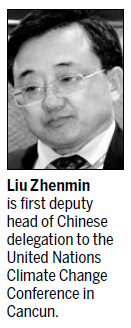Green China
No changes for China's position on emissions
Updated: 2010-12-09 09:48
By Li Xing and Li Jing (China Daily)

CANCUN, Mexico - China has made it clear that the nature of national mitigation actions of developing countries - including China - will not be changed.
"This national voluntary pledge is autonomous; it is not negotiable; (it is) not imposed by the outside," said Liu Zhenmin, first deputy head of Chinese delegation to the United Nations Climate Change Conference in Cancun, in his first meeting with the media.
Liu was responding to a Reuters report that "China is willing to make its voluntary carbon emissions target part of a binding UN resolution".
There could be "some misinterpretation", said Liu.
Su Wei, deputy head of the Chinese delegation and also chief climate change negotiator, told reporters: "I don't think the head of Chinese delegation (Xie Zhenhua), has alluded to that at the news conference on Dec 6.
"I think you should listen to his words and I think the head of the delegation is the most authoritative source of information. You should use that information as China's official position."
Liu said that under the United Nations Framework on Climate Change, "international legally binding commitments are only for Annex I countries (in the Kyoto Protocol) - the developed countries, not for developing countries".
China is a developing country and it is not subjected to internationally binding frame under the negotiations. "That's the distinction between the developed and developing countries," he said, as it follows the principle of "common but differentiated responsibilities".
Despite the voluntary nature of China's independent mitigation actions, "we shall honor our pledges. The pledges are incorporated in our national plan for social development and approved by the National People's Congress", he said.
"They will be implemented as part of our contribution to the global efforts in addressing climate change."
Liu said China has very sophisticated systems of policies and actions to combat climate change.
Meanwhile, under the Copenhagen Accord, which Liu said is also a UN document and within the framework, voluntary mitigation pledges of developing countries would be subjected to international consultation and analysis (ICA).
| ||||
Transparency applies to all countries, but the procedures to ensure accountability should be different, he said, acknowledging that the representatives are yet to hammer out details in the negotiations.
Cancun is the fifth climate change negotiations Liu is attending. As one of the Chinese chief negotiators, Liu witnessed the signing of the Kyoto Protocol in December 1997, which he describes as a "historic landmark" in climate change negotiations.
It took two years of "very serious negotiations, taking into account different concerns of all parties", he said.
Annex 1 nations are still in the middle of their first commitment period. "It would be really bad for those countries to talk about abandoning it," Liu said.
The protocol "must be kept", he said. "We will try our best to defend the Kyoto Protocol, and expect the developed countries will renew their second commitment period beyond 2012."
E-paper

Ear We Go
China and the world set to embrace the merciful, peaceful year of rabbit
Preview of the coming issue
Carrefour finds the going tough in China
Maid to Order
Specials

Mysteries written in blood
Historical records and Caucasian features of locals suggest link with Roman Empire.

Winning Charm
Coastal Yantai banks on little things that matter to grow

New rules to hit property market
The State Council launched a new round of measures to rein in property prices.




